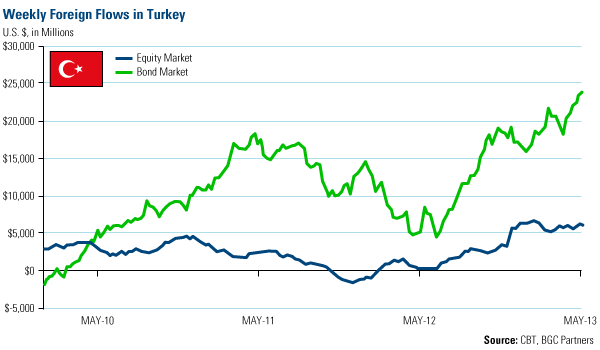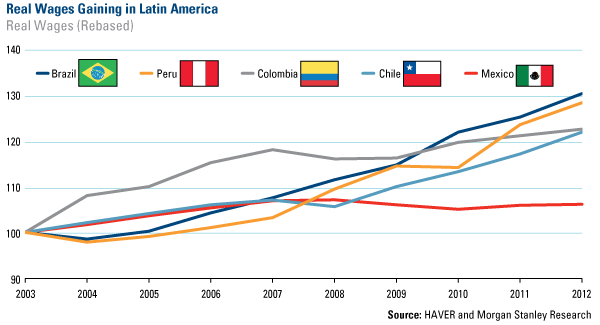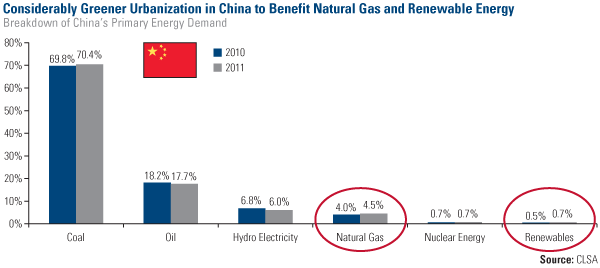Emerging Markets Radar (May 27, 2013)
Strengths
- Fund flows into Turkey continue at an unstoppable pace. It is now evident that much of the strength in the domestic stock and bond markets has been driven by foreign investors redirecting their capital into the country. As the chart above demonstrates, foreign inflows to both the stock market and the debt market have been on an uptrend for the most part of the last 12 months. Following the second credit upgrade last week, the inflows are expected to continue rising – especially now that investment-grade only institutional investors have more reason to look into the country – which should continue to support the higher valuations.
- The Colombian Energy and Mining Minister announced the country is submitting a voluntary application for membership at the Extractive Industries Transparency Initiative created by former U.K. Prime Minister Tony Blair. The organization is set to promote the use of transparency policies at the government level, with an emphasis on full disclosure – by both governments and companies – of payments and receipts resulting from the extraction of natural resources. The Ministry aims to ratify its commitment to the implementation of best practices (in governance) and address public concerns of misuse of royalties resulting from natural resource extraction.
- Passenger vehicle sales in the first three weeks of May in China rose 20 percent on a year-over-year basis.
- Thailand’s April exports were up 10.5 percent, exceeding the market estimate of 5.3 percent. In particular, intra-Asia ex-Japan trades were up 15.7 percent year-over-year. Imports went up 8.9 percent.
- The Beijing municipality sold three land plots in Wednesday’s auction for RMB 3.52 billion, the highest single-day land sales since the government launched property-curbing measures. Nearly 40 residential property projects are waiting for pre-sales approval from Beijing’s land authority, causing a short-term supply shortage and putting upward pressure on home prices in the city. At present, Beijing’s housing inventory level is less than 40,000 units, far below the quantity needed – 90,000 units. With a weak May PMI number, the street consensus is that the government will not further tighten the housing market since it is one of the most important drivers for GDP growth. If that is true, supply will be increased and developers will continue to grow their sales.
- Singapore’s first-quarter GDP grew 0.2 percent versus the market expectation of -0.6 percent. Construction accelerated 7.3 percent in the quarter, offsetting manufacturing weakness being down 6.8 percent. Singapore’s April Consumer Price Index (CPI) was 1.5 percent versus the market forecast of 3 percent due to a sharper-than-expected fall in transportation costs.
- Indonesia’s new budget draft increased deficit spending to 2.5 percent of GDP from 1.7 percent previously, which should benefit infrastructure investments.
- In Hong Kong, major banks, including HSBC and Citibank, decreased mortgage rates back to 2.15 percent from 2.4 percent previously.
- The Philippines asked trust companies to reduce investment holdings in Special Deposit Accounts (SDA) by 30 percent, which potentially creates a positive money flow into the equity market.
Weaknesses
- April retail sales fell unexpectedly in Poland, disappointing analysts who forecasted a 1.1 percent rise for the month. In addition, reports from the statistics office earlier in the week highlighted a decrease in industrial output, as well as a marked decrease in employment numbers. Central Bank member Bratkowski was quoted as saying he will seek a 50 basis-point cut at the June meeting as the slow recovery harms the economy’s output.
- With unemployment levels at historical lows in Chile, Colombia and Peru, it is not surprising that labor cost pressures have been on the rise. Morgan Stanley’s Andean Equity Strategy compared the exposure of eight sectors to labor inflation by measuring labor costs as a percentage of operating earnings. Its analysis suggests the worst-performing sector in a continued labor inflation period would be industrials, since labor costs approximate 252 percent of operating earnings. However, the research also shows how the utilities and financial sectors are candidates for outperformance given their lowest ratio of labor costs to operating earnings, 26 percent and 56, percent respectively.
- The HSBC China Flash PMI for the month of May is 49.6 versus the consensus 50.4. A PMI below 50 indicates the economy is in contraction, which will add pressure to China’s government to keep easing monetary policy and to consider certain fiscal spending. One of the reasons for slowing growth this month may be the austerity policy and anti-corruption measures, which drive away consumption spending by governments and state-owned enterprises. People said they saw empty high-end restaurants in Beijing where business deals usually are discussed and closed.
- In preliminary solar trade talks, the E.U. and U.S. rejected China’s proposal to settle solar products. This may lead China to retaliate by imposing a tariff on silicon imports from the U.S. makers.
- Rumor says that China may cut the coal power tariff to pass the lower coal price benefit to consumers. China had just cut a power tariff for the agricultural sector. China will also ban low-quality coal imports. Overall, China will discourage coal-fired power in favor of alternative energy and gas.
- On Friday, a Reuters’ article alleging the “new” urbanization plan was rejected by China’s Premier Li Keqiang triggered a cyclicals selloff, although this was denied by the National Development and Reform Commission. It seems the Chinese government is still in the process of fine-tuning urbanization plans.
Opportunities
- VTB Bank, Russia’s second-largest bank, is calling on policymakers at the Russian Central Bank to cut interest rates to help spur credit as the country’s Producer Price Index slowed to 1.6 percent from the previous 3.4 percent. President Vladimir Putin said the central bank would refrain from monetary easing, forcing private banks to contract their interest margins and pass on the lower rates to creditors. In June, Elvira Nabiullina will take over as Central Bank Governor, which has led local bank executives to believe central bank monetary easing measures should not be ruled out, which would benefit Sberbank and VTB, the country’s largest banks.
- The Pacific Alliance bloc – formed by Chile, Colombia, Mexico, and Peru – held its seventh summit in Colombia on Thursday. The Alliance, whose goal is to drop barriers on labor, finance, and trade and consolidate itself as a nexus for commerce with Asia, agreed to begin dropping tariffs on 90 percent of all goods traded among members. More than a dozen countries attended the event as observers following the international attention drawn by the Alliance’s ambitious goals. Canadian Prime Minister Stephen Harper and his Spanish counterpart Mariano Rajoy attended the event, raising hopes that the Alliance could expand beyond Latin America.
- As shown in the graph above, coal is still the primary energy source in China, which will be changed. China has targeted 20 percent for natural gas consumption in its energy mix by the year 2016, up from 6 percent currently. This creates a huge opportunity for natural gas producers and distributors.
Threats
- Amid falling electricity prices in the region, a new dispute has sparked between the finance minister and the prime minister of the Czech Republic over a $10 billion nuclear power expansion project. Finance Minister Kalousek has questioned the economic sense of the investment at a time when electricity prices are in continued decline across the region, and given the little interest the project has sparked among firms invited to participate in the bidding process. Meanwhile, Prime Minister Petr Necas said the country’s energy strategy will be hard to imagine without building new reactors, in what appeared to be a justification of his persistent support for the project.
- UBS Global Emerging Markets Strategy studied numerous corporate governance rankings and concluded emerging market companies continue to have a lower corporate governance score than U.S. companies. Moreover, there is little evidence of emerging markets converging to the corporate governance ratings obtained by developed markets. In fact, over the last two years, corporate governance in emerging markets appears to have declined more pronouncedly, moving further away from an already declining score in developed markets. Strong economic growth in emerging markets appears to have masked this phenomenon, but if growth were to recede, governance risks would pose a serious threat to the markets.
- China’s austerity measures probably have negatively affected second-quarter GDP growth, which will be released in July. Already the street had downgraded China’s GDP growth after weaker-than-expected first quarter and April economic statistics. In the long-term, anti-corruption and government spending austerity are good for the economy and efficiency of enterprises. Investors should know the difference between China’s austerity and the eurozone’s. While the eurozone tightens lavish social spending, China bans government officials and state-owned enterprise executives from corruption and personal gifting and entertainment spending. However, the side effect of these measures is to temporarily slow down business activities before things reverse to normal.















